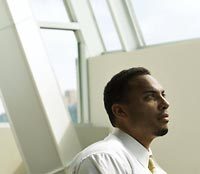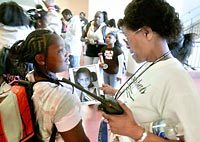Seattle's African American Academy gets one more try

Seattle's African American Academy was supposed to be a model for educating black children.
After almost two decades, it has come to represent the district's continuing failure to raise black students' academic achievement.
Seventh-grade math test scores at the K-8 school are the lowest in the district. Enrollment has declined, from a peak of 508 students six years ago to 339 today. When the district chose someone from outside Seattle to take over as principal this fall, the school's backers protested the decision, a controversy that threatens to drain more students from the school's half-full building on South Beacon Hill.
Now, as part of a new commitment to boost low-performing schools in the South End, the district is pledging $462,769 this year — enough for six teachers — to the academy, along with a math coach and a reading coach. If the school doesn't show progress over the next few years, the district may close it.
"We are making that change, putting the supports in, holding them accountable, and if that doesn't work, we have to look at other options," said Chief Academic Officer Carla Santorno.
"Letting it limp along is a mistake we've made."
A longtime dream
The African American Academy was the longtime dream of black education activists who were frustrated that even with integration efforts like busing and school choice, black students weren't doing well in school. They wanted a school the African-American community could rally around, where black students felt accepted. When it opened in a shared Central Area building in 1991, 167 students were turned away because of a lack of space.
They planned a K-12 school where any student could enroll, but with an African-American focus, where curriculum is grounded in cultural principles such as unity, purpose and creativity, and where African-American history doesn't start with slavery. Students wear uniforms and are called "scholars." Some of the curriculum focuses on identity issues. For example, in one unit, middle-school kids watched the evening news and discussed its portrayal of African Americans.
District leaders say they want parents to have the choice of a school with an African-American focus, but they stop short of outspoken support for the school.
"I don't feel like the district always made the academy the priority that it could have been and should have been," said Tony Orange, one of the school's founders who now runs a social-service organization in the Central Area. "I think that had they seen it as the jewel that it is, that they would have invested more into it and felt more like we felt about it."
Orange is part of a powerful community group called Friends of the African American Academy. Members, who represent some of the most influential African-American organizations in Seattle, volunteer in classrooms and lobby the district for more money and materials. In a school where only 16 percent of students come from a two-parent household, the community is key to survival.
It's rare to find such an active group of school advocates who aren't parents, and their passion sometimes catches school critics by surprise. Several members of a committee that recommended school closures last year said district staffers essentially told them to leave the African American Academy alone.
"Every time they threaten the academy, these people that have history with the school just circle around it," said Rickie Malone, who retired as the academy's principal in June.
That passion helps explain why the school has survived despite its spotty academic record.
"If the African American Academy outright fails, African-American people fail," PTSA President DaZanne Porter said. "That's why you have community people who don't even have children there who are working with our scholars and trying to figure out what it is that they can do."
"Pitiful" test scores
Departing principal Malone, 57, has now retired for the second time. She was among a group of African-American educational leaders who first posed the possibility of an academy in the late 1980s. She still has "a mighty hope" for its success, she said. But she's moving out of state to escape the school's politics. She's baffled by the school's marginal academic success.
"It's pitiful," she said of the school's test scores. "I'm the first one to say that. We're not doing what we truly believe we can."
This year, the academy was the only school in Seattle facing the fourth step of federal sanctions under the No Child Left Behind law. Step four means the school must prepare for alternative governance.
In response, the district pointed to things it is already doing: installing a new principal and adding academic coaches. If the school can't catch up with state standards next year, the district will already have begun the next step: restructuring of the school. Under federal law, replacing the principal and adding staff in critical roles count as restructuring.
District analysis of test scores shows that academy students make impressive academic gains year over year, especially in the elementary grades. But their seventh-grade math scores are the lowest in the district. In the 2005-06 school year, less than 4 percent of the academy's seventh-graders passed the reading, writing and math portions of the Washington Assessment of Student Learning (WASL).
Although fourth-graders at the academy do better than black students districtwide, their success has been inconsistent. First- and second-graders do well on reading and writing tests that are given orally, one on one, but district officials don't consider those as dependable a measurement as WASL scores.
Like other districts around the country, Seattle has been working for years to improve African-American student test scores, which lag behind those of students of other races.
Vision not fulfilled
Many districts around the country have added an African American-focused curriculum to schools that already have an all or mostly black enrollment. It's more unusual to build an African-American school from scratch.
Northwestern University Professor Carol Lee helped found a K-8 school with an Afro-centric curriculum in Chicago. Enrollment at Betty Shabbaz International Charter School is 99.6 percent African American, and nearly three-quarters are in poverty. Kids there do better than the district average on state tests, and more than twice as many Shabbaz students passed the state test in 2004 than in 2000.
Nationwide, most African-American-focused schools are successful, Lee said. Her research shows that kids learn best if they perceive that their teachers like them, if they are motivated and if they can connect what they're learning with what they already know. A cultural focus can help those things work together, she said. But to succeed, school leaders have to translate that to kids' academic needs.
"Saying you're African centered or saying you have a cultural focus is not proficient," she said.
Local Urban League President James Kelly was one of the African American Academy's founders. He envisioned University of Washington experts helping school leaders write curriculum. He hoped the school would become a national model of how to teach African-American kids.
The school hasn't achieved his vision, and he's not sure who to blame. "It's just been too many cooks and what we thought we were trying to bake isn't, you know, what we ended up with today," Kelly said. "The original vision of a demonstration school with all these wonderful gurus around it really just has never had a chance to come to fruition."
The academy has had a half-dozen principals and four locations. Before moving into its new building, the school was on Magnolia Bluff — far from most of its students' homes. School leaders say the district didn't visit enough or give the school enough support. District leaders say the school community was too protective and resisted district input.
As a parent, Linda Kennedy helped establish the school and enrolled her son in 1991 as a first-grader. After two years, she left — "heartbroken" but unwilling to risk her son's education for the vision of an African-American school. The academy seemed doomed by a mediocre teaching corps, tension between two principals sharing a building and lukewarm district support, she said. She enrolled her son in private school.
When the principal asked her to stay, she said, she told him: "This is my child. I can't experiment with him ... I need a school that's going to work now."
She wasn't the only one. She said middle- and upper-class parents "left in droves."
"Anybody who could afford to send their child somewhere else did."
New principal
Rifts of communication and vision have separated Seattle Public Schools and Friends of the African American Academy for years, but they say they want the same things: academic success, a quality school, a rigorous curriculum.
"People look at the African American Academy as an albatross or whatever," Orange said, "[but] all we are saying is we wanted the academic achievement to excel and we thought that this was a way to promote academic excellence."
The district is stepping up its support this year, Santorno said.
"Superintendent Maria Goodloe-Johnson and I strongly support AAA as we do all of the schools throughout our district," she said in an e-mail. "We are dedicated to the academic achievement of every child at every school."
District leaders say they had the same goal in mind when they passed over academy vice principal and community favorite Henterson Carlisle this summer and hired Chris Carter to take over as principal. Carter, 38, was a middle-school assistant principal in the Highline School District.
Friends of the African American Academy felt snubbed by the choice and launched an aggressive campaign to appoint Carlisle.
Santorno said the answer to the school's problems lies in resources. Instead of tossing a few extra dollars at the school, the district needs to invest and then hold the school accountable, she said. That's why she hired an experienced and committed principal who is a strong academic leader, she said.
As for Carter, the vision he casts for the academy is remarkably similar to the one the school's founders cast nearly two decades ago: a model of how to teach black students, a haven where students are supported and free to succeed.
"Failure is just not an option," he said, adding: "I don't think it's rocket science to make significant gains."
Emily Heffter: 206-464-8246 or eheffter@seattletimes.com
